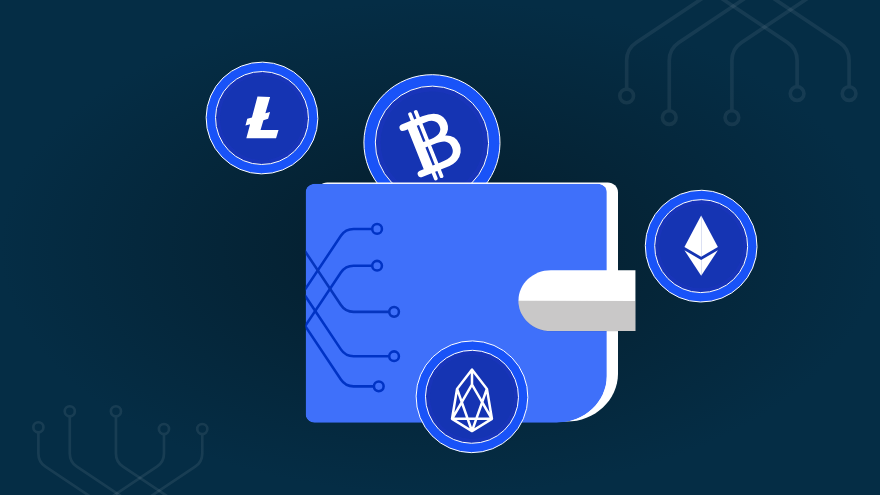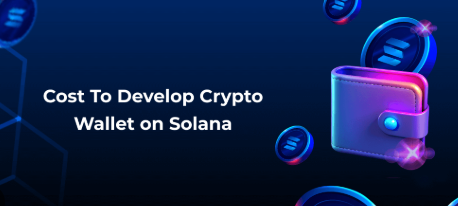In this article, I will talk about the cost of building a crypto wallet on Solana. I will cover key factors, pricing ranges, and important features that affect development costs.
Solana’s high speed, scalability, and low transaction fees make it a great option for creating wallets. Let’s take a look at how much it costs to develop an effective Solana-based crypto wallet.
What is Crypto Wallet?
A crypto wallet is a digital tool that lets users store, send, and receive cryptocurrencies like Bitcoin, Ethereum, or Solana safely. It doesn’t keep the coins themselves; instead, it stores the private and public keys needed to manage blockchain-based assets.

There are two main types of wallets: hot wallets, which are online and convenient but more vulnerable, and cold wallets, which are offline and very secure.
Modern crypto wallets also support multiple tokens, decentralized apps, and staking features. They ensure user ownership, improve security, and offer easy access to blockchain networks for trading, investing, and decentralized finance activities.
Cost to Build a Crypto Wallet on Solana

Cost to Build a Crypto Wallet on Solana
The cost of developing a crypto wallet on Solana depends on the wallet type, features, and development method. Here are the main cost components:
Basic Wallet (Essential Features): $15,000 to $25,000
- Supports basic send/receive functions, SOL token management, and simple UI.
Mid-Range Wallet (Enhanced Features): $25,000 to $50,000
- Includes better UI/UX, multi-asset support (SPL tokens), staking, and transaction history.
Advanced Wallet (Full-Feature + DeFi Integration): $50,000 to $100,000+
- Offers DeFi, NFT, and cross-chain integration, top security, and custom branding.
UI/UX Design Cost: $3,000 to $10,000
- Depends on the complexity and visual quality of the wallet.
Backend & Blockchain Integration: $10,000 to $40,000
- Covers Solana SDKs, APIs, smart contract connections, and transaction management.
Security Features Implementation: $5,000 to $15,000
- Includes encryption, 2FA, seed phrase management, and anti-phishing protection.
Testing & Maintenance: $3,000 to $10,000 (initial)
- Regular updates, bug fixes, and feature improvements after launch.
Development Team Location
- USA/UK: $80–$150 per hour
- Eastern Europe: $40–$80 per hour
- Asia/India: $25–$50 per hour
Average Estimated Cost: $25,000 to $80,000 for a fully functional Solana crypto wallet, depending on complexity and development scope.
Why Choose Solana for Crypto Wallet Development
High Transaction Speed
Solana can process over 65,000 transactions per second (TPS). This speed makes it one of the fastest blockchains, ensuring quick wallet operations and a smooth user experience.
Low Transaction Fees
Transaction costs on Solana are very low, usually less than $0.01 per transaction. This makes it cost-effective for both developers and users.
Scalability
Solana’s unique Proof-of-History (PoH) combined with Proof-of-Stake (PoS) allows for high scalability without sacrificing performance. This is ideal for growing user bases.
Developer-Friendly Ecosystem
Solana offers powerful SDKs, APIs, and documentation. These resources enable faster and more efficient wallet development with fewer technical hurdles.
Strong Security Infrastructure
Its cryptographic systems and decentralized architecture ensure robust security for wallet transactions and data.
Interoperability & Ecosystem Growth
Solana integrates smoothly with DeFi, NFT, and Web3 platforms. This allows developers to expand wallet functionality beyond basic transactions.
Active Community & Support
A large global community and regular ecosystem updates provide continuous support, innovation, and stability for Solana-based projects.
Ideal for Mobile & Web Wallets
Thanks to its lightweight and efficient framework, Solana is well-suited for building responsive mobile and web wallets with fast sync and performance.
Choosing the Right Development Partner
Experience in Blockchain & Solana Development
- Choose a company with proven experience in Solana projects and a solid understanding of blockchain design, smart contracts, and crypto wallet functions.
Comprehensive Portfolio
- Review their past wallet development projects to evaluate design quality, scalability, and user experience. A varied portfolio shows their ability to meet different needs.
Technical Expertise
- Make sure the team is skilled in Rust, C, JavaScript, and Solana SDKs. These skills are essential for secure and high-performance wallet development.
Security-First Approach
- Partner with developers who focus on strong security measures, including encryption, 2FA, and private key protection, to keep user data safe.
Transparent Pricing & Timelines
- A trustworthy company provides a clear cost estimate and project timeline. Avoid companies with hidden fees and unrealistic delivery promises.
Post-Launch Support & Maintenance
- Ensure the partner offers ongoing technical support, updates, and bug fixes to keep your wallet running smoothly and securely.
Tech Stack for Solana Wallet Development
Tech Stack for Solana Wallet Development
Programming Languages
- Rust: This is the main language for Solana smart contracts, offering high performance and security.
- C & C++: These languages are used for components requiring high performance and for backend development.
- JavaScript / TypeScript: These are used for the frontend and for integrating the Solana SDK in web or mobile wallets.
Frameworks & Libraries
- React / React Native: These are great for building responsive web and mobile wallet interfaces.
- Node.js: This handles backend operations and API communications well.
- Express.js: This helps create RESTful APIs for smooth wallet-server interactions.
Solana Development Tools
- Solana SDK & CLI: These are essential tools for building, testing, and deploying Solana programs.
- Anchor Framework: This simplifies the development of Solana smart contracts.
- Solana Web3.js: This allows integration between the wallet frontend and the Solana blockchain.
Databases
- MongoDB / PostgreSQL: These store user data, transaction logs, and metadata securely.
- Redis: This is used for caching and improving wallet performance.
APIs & Integrations
- Solana JSON RPC API: This makes it easier to retrieve blockchain data and broadcast transactions.
- Third-party APIs: These are used for exchange rates, fiat gateways, or NFT/DeFi integration.
Key Features of a Solana-Based Crypto Wallet
User Authentication & Security
- Secure login options with 2FA, PIN, biometric verification, and seed phrase backup to protect user accounts and assets.
Multi-Asset Support
- Enables users to store, send, and receive SOL and SPL tokens, allowing access to the entire Solana ecosystem.
Real-Time Transaction Processing
- Fast and seamless sending and receiving of crypto thanks to Solana’s high-speed blockchain performance.
Portfolio Management Dashboard
- A unified dashboard that displays asset balances, transaction history, and real-time token values for easy tracking.
Staking & Rewards Integration
- Allows users to stake SOL tokens directly from the wallet and earn staking rewards securely.
DeFi & dApp Integration
- Direct access to decentralized finance platforms and dApps built on Solana without leaving the wallet interface.
Future of Crypto Wallets on Solana
The future of crypto wallets on Solana looks promising as the blockchain keeps evolving with faster performance, lower fees, and more ecosystem support. Solana’s ability to handle a lot of transactions quickly makes it perfect for next-generation wallets.
These wallets will integrate DeFi, NFTs, staking, and cross-chain features. As Web3 grows, future Solana wallets will become multi-functional hubs. Users will be able to manage digital assets, access decentralized apps, and engage in the wider crypto economy without any hassle.
Better security protocols, AI-driven insights, and easy-to-use designs will also boost adoption, making Solana wallets a key part of mainstream blockchain finance and digital asset management.
Conclusion
Building a crypto wallet on Solana is a smart investment for businesses entering the blockchain space. Solana has high transaction speeds, low fees, and a scalable structure. This makes it a great place to create secure and feature-rich wallets.
The total development cost ranges from $25,000 to over $100,000, depending on the complexity, features, and design.
Investing in quality development, strong security, and a skilled Solana development team leads to long-term success and builds user trust. As Solana’s ecosystem keeps growing, developing a wallet on this blockchain offers important chances for innovation, growth, and profit in digital finance.
FAQ
How much does it cost to build a crypto wallet on Solana?
The cost typically ranges from $25,000 to $100,000+, depending on the wallet’s features, design complexity, and development team location.
What factors affect the cost of Solana wallet development?
Key factors include wallet type, feature set, security level, UI/UX design, API integrations, and developer rates based on region.
How long does it take to develop a Solana-based crypto wallet?
On average, it takes 3 to 6 months to build a fully functional Solana wallet, depending on the scope and custom features required.
Can I reduce the development cost of my Solana wallet?
Yes. You can minimize costs by starting with an MVP, using Solana SDKs, or hiring experienced blockchain developers from cost-effective regions.
Is Solana a good choice for wallet development?
Absolutely. Solana offers high scalability, low transaction fees, and fast processing speeds, making it one of the best blockchains for crypto wallet development.








